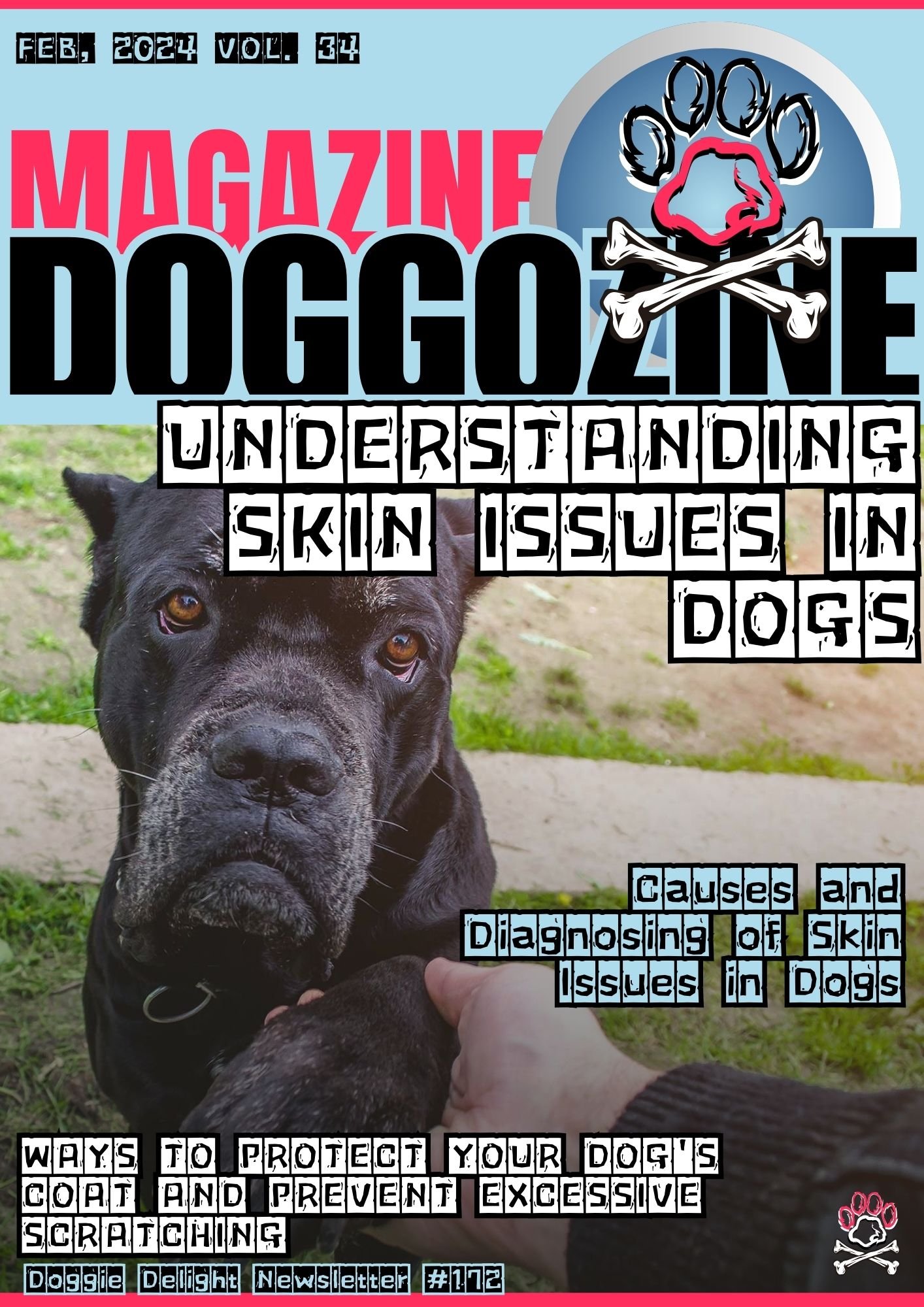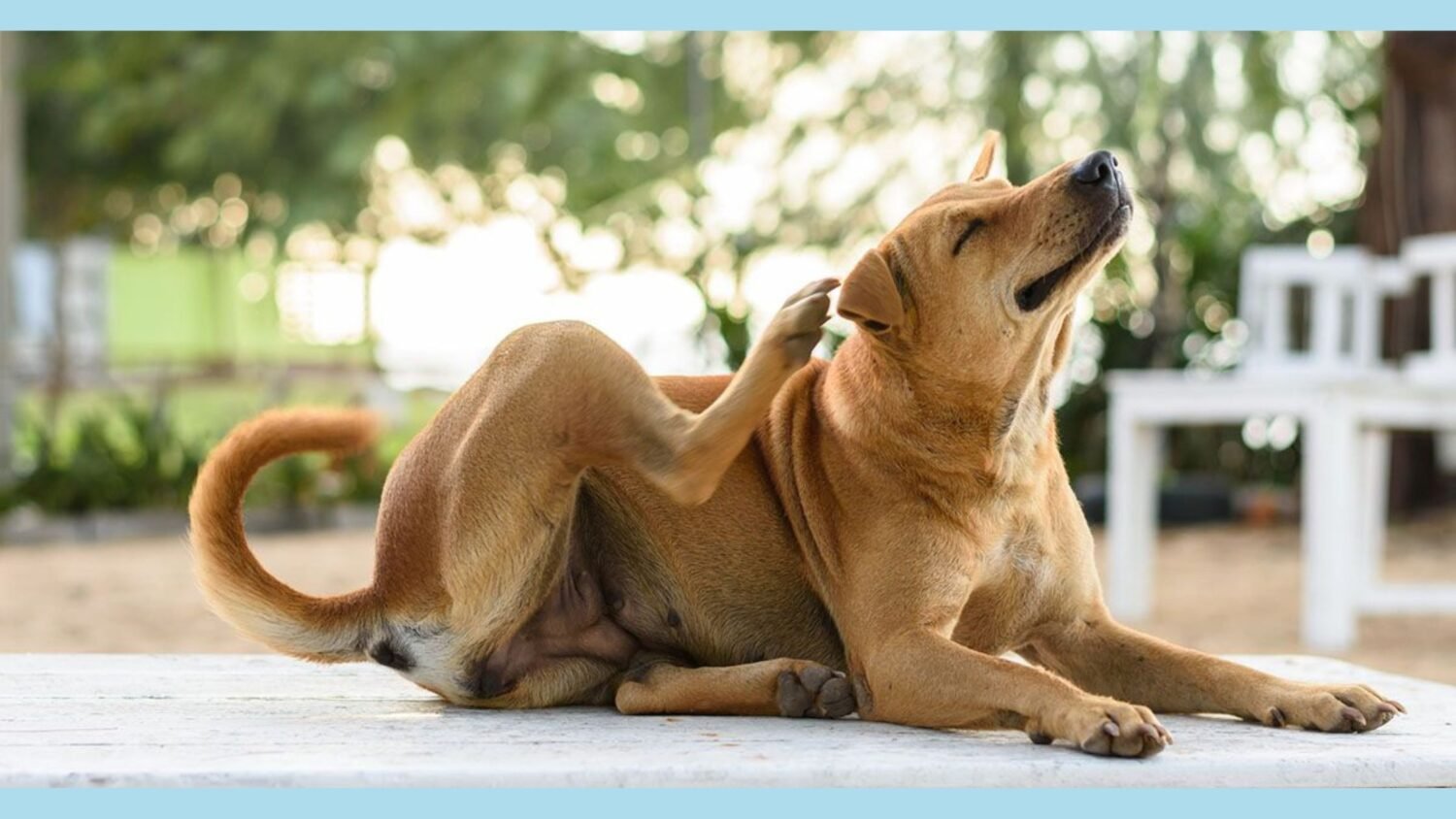
UNDERSTANDING AND MANAGING SKIN ISSUES IN DOGS
Dogs often have skin issues. They can scratch, get red spots, or lose fur. To keep dogs healthy, we need to know what causes these issues and how to manage them.
Causes of Skin Issues in Dogs
There are many reasons why dogs get skin problems:
- Allergies: Like humans, dogs can be allergic to things like pollen, dust, food, or flea bites. These allergies make them itch and get irritated skin.
- Pests: Fleas, ticks, and mites can live on a dog’s skin. They bite and cause extreme itching. They can also spread diseases that affect the skin.
- Infections: Bacteria or fungi can infect the skin if it’s hurt or damaged. This makes the skin red, swollen, and painful for the dog.
- Poor Diet: Not eating the right foods can cause skin issues. Dogs need a balanced diet to keep their skin and fur healthy.
- Environment: Very hot or cold weather can bother a dog’s skin. Dry air, low humidity, and too many baths can also dry out their skin, making it itchy.
- Genetic Predisposition: Certain dog breeds are more prone to skin issues due to their genetic makeup. Breeds like Bulldogs, Retrievers, and Terriers are known to have a higher risk of developing skin problems.
Diagnosing Skin Issues in Dogs
Identifying the underlying cause of a dog’s skin problem is crucial for effective treatment. If your dog is experiencing persistent skin issues, it is best to consult a veterinarian. The vet will perform a thorough examination and may recommend additional tests, such as skin scrapings, blood tests, or allergy testing, to determine the root cause of the problem.

TREATMENT AND MANAGEMENT FOR SKIN ISSUES IN DOGS
The treatment and management of skin issues in dogs depend on the underlying cause.
Here are some common approaches:
Dog Allergies
If allergies are the culprit, the veterinarian may recommend:
- Antihistamines: These medications help reduce itching and inflammation caused by allergies.
- Corticosteroids: In more severe cases, corticosteroids may be prescribed to alleviate symptoms.
- Allergen Avoidance: Identifying and avoiding the specific allergens that trigger the dog’s reaction can significantly improve their skin condition.
- Immunotherapy: In some cases, allergy shots or oral drops may be prescribed to desensitize the dog’s immune system to specific allergens over time.
Dog Parasites
To address parasite-related skin issues, the following treatments may be recommended:
- Topical Medications: Flea and tick preventives, such as spot-on treatments or collars, can help eliminate parasites and prevent reinfestation.
- Oral Medications: In more severe cases, oral medications may be prescribed to target internal parasites.
- Regular Grooming: Regular brushing and bathing can help remove and prevent parasites from infesting the dog’s skin.
Skin Infections in Dogs
If a bacterial or fungal infection is present, the veterinarian may suggest the following treatments:
- Antibiotics or Antifungals: Depending on the type of infection, specific medications may be prescribed to combat the bacteria or fungus.
- Topical Treatments: Shampoos, creams, or ointments containing antimicrobial agents can help alleviate symptoms and promote healing.
- Wound Care: Proper cleaning and care of any open sores or wounds are essential to prevent further infection.
Dietary Factors for Skin Issues in Dogs
To address dietary-related skin issues, the veterinarian may recommend:
- A hypoallergenic food without common allergens. This can help find and manage food sensitivities.
- Omega 3 fatty acids or other supplements may support healthy skin and reduce inflammation.
Environmental Factors for Skin Issues in Dogs
To manage skin problems caused by environmental factors, consider the following:
- Ensure your dog has a comfortable, protected space away from extreme weather conditions. This provides adequate shelter.
- Using dog-friendly moisturizers or conditioners can help alleviate dryness and maintain the dog skin’s natural moisture balance.
- Excessive dog bathing can strip the skin of its natural oils. Limit bathing to when necessary and use gentle, hypoallergenic shampoos.


PREVENTING SKIN ISSUES IN DOGS
Some skin problems cannot be prevented.
Things you can do to lower the risk:
- Feed your dog a healthy diet. This helps keep the skin and coat healthy.
- Brush your dog’s fur often. This gets rid of loose hair, dirt, and bugs.
- Protect your dog from fleas and ticks. Use products made for this.
- Keep your dog’s bed, toys, and living area clean. This removes things that can irritate the skin.
- Take your dog to the vet regularly. The vet can catch and treat skin problems early.
Skin issues can make a dog unhappy. Understanding the causes and treating it right can help. If your dog has bad or ongoing skin problems, talk to the vet. They can give advice and medicine to help.

HOW TO CARE FOR YOUR DOG’S FUR AND STOP ITCHING
As a caring dog owner, it’s important to keep your furry friend healthy. Dogs often scratch a lot. Too much scratching can hurt them and cause skin problems. In this article, we’ll share simple tips to protect your dog’s coat and stop excessive scratching.
Groom Regularly and Feed a Balanced Diet
Brushing your dog often helps keep their fur in good shape. It removes loose hair, dirt, and tangled mats. Brushing also helps spread natural oils that keep the coat soft and moisturized. Choose a brush or comb that works for your dog’s fur type. Try to brush your pup at least once a week.
A healthy diet is key for your dog’s overall well-being, including their coat. Make sure your dog eats high-quality proteins, good fats, vitamins, and minerals. Foods with omega-3 fatty acids like fish oil are great for shiny coats and preventing skin irritation. Ask your vet for the right diet for your dog’s needs.
Bathe Properly and Use Quality Products
Bathing helps remove dirt, dander, and allergens from your dog’s fur. But bathing too often can strip away natural oils, leading to dry skin and scratching. Only bathe your pup when needed, around once a month. Use a mild, dog-safe shampoo and rinse thoroughly. Avoid human shampoos which can irritate dogs’ skin.
After bathing, apply a leave-in conditioner or coat supplement to keep fur soft and moisturized. Quality grooming products with natural ingredients can soothe itchy skin and minimize scratching. Ask your groomer or vet for product recommendations tailored to your dog’s breed and needs.
Check for Fleas and Allergies
Fleas and allergies are common reasons why dogs scratch excessively. Inspect your pup’s coat regularly for any signs of fleas or flea dirt. Use safe, effective flea prevention treatments as recommended by your vet. If allergies are causing irritation, your vet can prescribe medication or suggest environmental changes to ease symptoms.
Provide plenty of enrichment like toys and activities to discourage excessive licking and chewing due to boredom or stress. With patience and proper grooming, you can help keep your furry friend’s coat healthy and stop persistent scratching.
Adequate Hydration and Avoid Harsh Chemicals
Proper hydration is crucial for your dog’s skin and coat health. Always check and make sure that your dog has access to fresh and clean water at all times. Dehydration can lead to dry skin and a dull coat, which can contribute to excessive scratching. If you notice that your dog is not drinking enough water, consult with your veterinarian to rule out any underlying health issues and to determine the best course of action.
When bathing your dog, it is important to use gentle, dog-specific shampoos and conditioners. Harsh chemicals found in some human products can strip the natural oils from your dog’s skin, leading to dryness and irritation. Look for products that are specifically formulated for dogs and are free from harsh ingredients. Additionally, avoid using any flea or tick treatments that may be too strong for your dog’s skin, as they can also cause irritation and scratching.
Regular Veterinary Check-ups and Environmental Allergens
Regular visits to the veterinarian are essential for maintaining your dog’s overall health and well-being. During these check-ups, your veterinarian can assess your dog’s skin and coat condition, identify any underlying issues, and provide appropriate treatment or recommendations. They can also advise you on the best preventive measures for fleas, ticks, and other parasites that can cause itching and scratching.
Just like humans, dogs can also be allergic to certain environmental factors such as pollen, dust mites, or mold. These allergens can cause itching and scratching. If you suspect that your dog may have allergies, consult with your veterinarian for proper diagnosis and treatment options. They may recommend allergy testing or prescribe medication to alleviate the symptoms and provide relief.
Regular Exercise, Mental Activities, and Managing Stress
Exercise is vital for your dog’s physical and mental health. Engaging in physical games and mentally stimulating activities can reduce stress and anxiety. This helps prevent excessive scratching. Make sure your dog gets enough exercise and playtime to stay happy and calm.
Stress can negatively affect your dog’s overall health, including their skin and coat. Dogs may feel stressed due to changes in their environment, separation from owners, or fear of certain situations. It’s important to identify and address causes of stress in your dog’s life. Providing a safe, comfortable space, using positive reinforcement training, and seeking professional help, if needed, can reduce stress and minimize excessive scratching.
Main Points About Dog Skin Problems
Protecting your dog’s coat and preventing excessive scratching requires proper grooming, a balanced diet, hydration, and regular veterinary check-ups. By following these steps and addressing any underlying issues, you can help your furry friend maintain a healthy, shiny coat, while also ensuring their overall well-being and happiness.
So remember to groom your dog well. Feed him a healthy diet with water. Take your dog to the vet regularly. Doing these things helps dogs’ coats stay nice. It prevents too much scratching. Dogs feel better and happier with nice, healthy fur.










